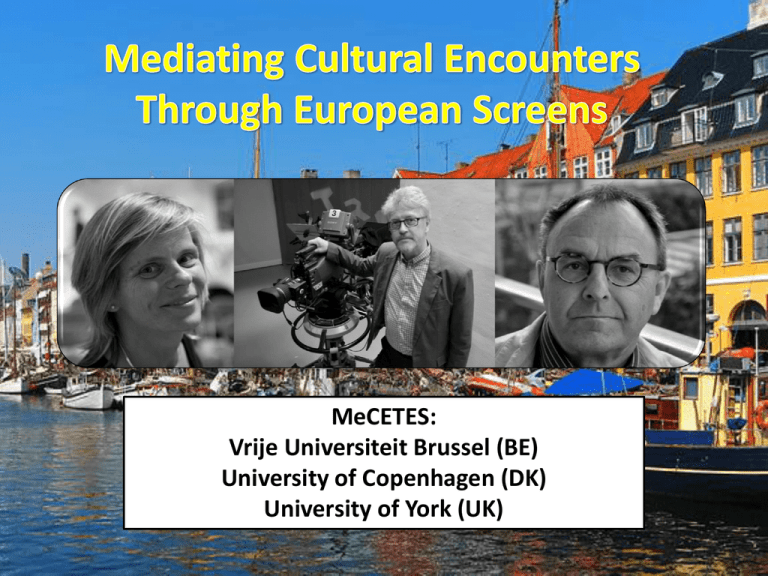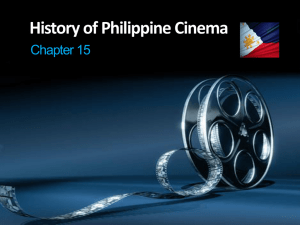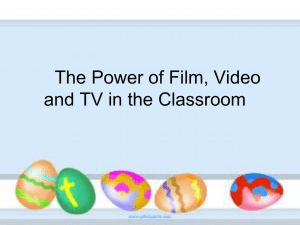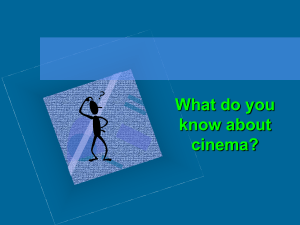Transnational European Film Research: Principles and
advertisement

MeCETES: Vrije Universiteit Brussel (BE) University of Copenhagen (DK) University of York (UK) The MeCETES collaboration: 3 historical cities, 3 modern campuses, 3 great teams Vrije Universiteit Brussel University of Copenhagen University of York Funding body: Humanities in the European Research Area (HERA) Theme: “Cultural Encounters” 18 collaborative European projects; each awarded €1m, 2013-2016 Projects launched at conference in Dubrovnik, 30 Sept/1 Oct 2013 MeCETES University of York, UK: leading on cinema Project Leader: Prof Andrew Higson 1 full-time Post-Doctoral Research Assistant: Huw Jones 1 part-time Administrator 1 full-time PhD student: Roderik Smits (part-funded) University of Copenhagen, Denmark: leading on TV drama Principal Investigator: Prof Ib Bondebjerg 3 part-time Post-Doctoral Research Assistants: Eva Novrup Redvall, Henrik Søndergaard, Dan Pedersen Vrije Universiteit Brussel (VUB), Belgium: leading on policy Principal Investigator: Prof Caroline Pauwels 1 full-time PhD student: Ilse Schooneknaep Academic Advisory Board made up of colleagues from across Europe Non-Academic Partners include colleagues from European, regional, national and sub-national policy bodies, film/TV organisations, broadcasters, film funders, and production 11.30 An overview of the MeCETES project (Andrew) 12.00 Encountering other Europeans – sub-national, national and European contexts for beginners: Ib: Denmark – size, population, constitutional status; size and organisation of film and TV industries; Caroline: Belgium and Flanders; Huw: UK; Ib: the EU; Henrik: EU television landscape and policy; Caroline: EU film landscape and policy 12.30 Work packages and organisational implications (Andrew) 13.00 Lunch 13.30 Methodological issues • Ib and Dan: audience data-gathering and analysis (10 mins) • Eva, Henrik: interviewing people in the creative sector: screen writers, producers, distributors (10 mins) • Henrik, Caroline: policy and policy makers (10 mins) • Huw: case study of a single film (10 mins) 15.00 Tea, coffee 15.15 Project conferences and other gatherings (Andrew) 15.30 Project outputs (publications etc) (Andrew) 15.45 Knowledge exchange and non-academic partners (Andrew) 16.00 The academic advisory panel (Andrew) 16.15 The project website (Andrew) 16.30 The financial details, and how we might secure additional funds (Andrew) 16.45 Management and reporting process (Andrew) 17.00 End 19.00 Evening meal (Almanak Restaurant, The Standard, Havnegade 44) Bron/Broen/The Bridge (Sweden/Denmark, 2011-) The basic premise: in modern societies, cultural encounters are largely mediated encounters How well do European screen fictions travel? How do different audiences make sense of European screen fictions? Forbrydelsen/The Killing (Denmark, DR, 2007-2012) Building bridges? Encountering other Europeans through television drama Bron/Broen/The Bridge (Sweden/Denmark, 2011-) Jagten/The Hunt (Denmark, 2012) European support mechanisms for cinema The European Film Market, Berlin Film Festival The macro: an overview of contemporary European cinema and television The micro: case studies of films and TV drama from the UK, Denmark and Belgium De Smaak van de Keyser (Belgium, VRT, 2008-09) What sorts of cultural encounters does historical drama enable in contemporary Europe? Analysing historical drama From questions of representation to the material circumstances of policy, funding, production, distribution and exhibition (in cinemas, on television and online). En kongelig affære/A Royal Affair (Denmark/Sweden/Czech Republic, Nicolaj Arcel, 2012) British Film Institute Audiovisual policies across Europe: fit for purpose? The bigger-budget, English-language, UK/US co-production The King’s Speech has travelled far more widely in Europe than the Danish-Swedish-Czech co-production A Royal Affair, taking far more money at the box-office, in far more countries. Both The King’s Speech and A Royal Affair were about European royalty, both travelled, but both still enjoyed their biggest success and their greatest market penetration in their domestic market. Even so, such historical dramas do travel. So how did audiences outside the domestic market respond to their cultural encounter with other Europeans? The King’s Speech (UK/US, 2010, dir Tom Hooper) Work packages and organisational implications Milestones and outputs: Autumn 2013 Planned start date: June 2013 • • • • • • • 1: Confirmation of work packages. 2: Advisory Board Meeting and Report. 3. Workshop agenda agreed. 4: Work packages agreed. 5: Budget allocation agreed. 6: Start of VUB PhD (Sept 2013). 7: Detailed plan of proposed developments confirmed and distributed to all stakeholders. • 8: Project website launched. Cinema/York Work Package: Year 1 A: Case studies of UK-originated historical films – ‘The King’s Speech’ and ‘Elizabeth: The Golden Age’: i. ii. iii. iv. v. vi. vii. Research funding and production process; Research distribution across all platforms; Interview key stakeholders; Analyse representations; Analyse viewing figures across all platforms; Survey reception, reviews, Internet commentary; Focus group screenings and discussions in UK. B: Collect and analyse data on films in DK, UK, BE and across Europe (2005present): Production, distribution and audience figures for national productions, coproductions and inward investment productions. C: Survey of cinema industry structures and transnational collaboration. D: Coordination of television focus groups in UK. E: Preparation of material for presentation on project website, at end-of-year workshop, as conference papers and for journal article. TV Drama/Copenhagen Work Package Year 1 A: Case studies of Denmark-originated television drama – ‘Borgen’ and ‘The Killing’: Tasks i-vii as for Cinema Work Package B: Collect and analyse data on European television series in DK, UK, BE and across Europe (2005-present): Production, distribution and audience figures for national series on all channels, European and American series in the three countries. C: Survey of television policy, industry structures and transnational collaboration. D: Coordination of cinema focus groups in DK. E: Preparation of material for presentation on project website, at end-of-year workshop, as conference papers and for journal article. Policy/Brussels Work Package: Year 1 • A: Survey of film and television policies since 2005, at EU and national (BE, DK, UK) levels. • B: Identification of key weaknesses in European distribution business, policy obstacles and digital opportunities. • C: Identification of key stakeholders. • D: Coordination of cinema and television focus groups in BE. • E: Preparation of material for presentation on project website, at end-of-year workshop, as conference papers and for journal article. Cinema/York Work Package: Year 2 A: Case studies of DK and BE heritage films: Tasks i-vii as for Year 1 B: Case studies of crime films in DK, UK and BE: Tasks i-vii as for Year 1 C: Facilitation of UK television case studies D: Coordination of television focus groups in UK. E: Preparation of material for presentation on project website, at end-of-year workshop, as conference papers and for journal article. TV Drama/Copenhagen Work Package Year 2 A: Case studies of UK and BE contemporary drama on TV: Tasks i-vii as above B: Case studies of TV crime drama in DK, UK and BE: Tasks i-vii as above C: Facilitation of DK cinema case studies D: Coordination of television focus groups in DK. E: Preparation of material for presentation on project website, at end-of-year workshop, as conference papers and for journal article. Policy/Brussels Work Package: Year 2 A: In-depth study, including stakeholder and SWOT analyses, of key policy issues relating to digital distribution (e.g. release windows, copyright regulation and competition policy) B: Facilitation of BE cinema and television case studies C: Coordination of cinema and television focus groups in BE. D: Preparation of material for presentation on project website, at end-of-year workshop, as policy position paper, as conference papers and for journal article. Cinema/York Work Package: Year 3 A: Case studies of contemporary drama on film in DK, UK and BE: Tasks i-vii as Year 1 B: Facilitation of UK television case studies C: Coordination of television focus groups in UK. D: Comparative analysis of case study data in relation to big-picture statistical data and core concept of transnational cultural encounters E: Preparation of material for presentation on project website, at end-of-year workshop, as conference papers and for journal article. TV Drama/Copenhagen Work Package Year 3 A: Case studies of TV historical drama in DK, UK and BE: Tasks i-vii as above B: Facilitation of DK cinema case studies C: Coordination of television focus groups in DK. D: Comparative analysis of case study data in relation to big-picture statistical data and core concept of transnational cultural encounters E: Preparation of material for presentation on project website, at end-of-year workshop, as conference papers and for journal article. Policy/Brussels Work Package: Year 3 A: Further in-depth study, including stakeholder and SWOT analyses, of key policy issues relating to digital distribution (examples as above) B: Evaluation of existing policies, measures and legislative frameworks, and development of policy recommendations C: Facilitation of BE cinema and television case studies D: Coordination of cinema and television focus groups in BE. E: Preparation of material for presentation on project website, at end-of-year workshop, as policy position paper, as conference papers and for journal article. Year 4 tasks 1. Preparation of final book publications: a) Films in Europe: Production, Distribution, Audiences, Identity; b) Television Drama in Europe: Production, Distribution, Audiences, Identity; c) Film and Television Policy in Europe. 2. Preparation of final policy briefing document and meeting. 3. Completion of PhDs at VUB and York Time for lunch, my dears! Project conferences and other gatherings Workshops proposed for Year 1 • Full-day agenda setting workshop in Brussels with Academic Partners, including two-hour meeting with Non-Academic Partners (individual meetings if unable to attend), at start of project • One day workshop at end of Year 1 (for research team, academic partners and non-academic partners; up to 30 participants). Each research team to present findings in separate workshop presentations. • Advisory Board meeting (at end of workshop) – to review progress, help shape outcomes and identify emerging issues. Workshops in Years 2, 3 and beyond • Two-day workshop at end of Year 2 (for research team, academic partners and non-academic partners; up to 30 participants). Followed by meeting of Advisory Board. • Three-day conference at end of Year 3 (participants as for workshops, plus invited others). Day 3 devoted to discussions with nonacademic partners, and other invited industry figures and policy-makers. Followed by meeting of Advisory Board. • Policy workshop in 2017, to launch final policy briefing document and recommendations. Funded by external partner. Project outputs (publications etc) Publications by end of year 1 • Initial findings on data on trends in European films and TV drama, and identification of main digital distribution policy issues presented as working papers on website. • Presentations on project to at least three international conferences. • A minimum of three peer-reviewed journal articles to be submitted. Publications by end of year 2 • First policy position paper completed, distributed and hosted on website. • 3 journal articles or book chapters to be submitted (e.g. TV crime drama and European audiences). • Minimum 3 conference papers (e.g. ECREA/SCMS). • Working papers and databases on website. Publications by end of year 3 • Second policy position paper completed and hosted on website. • 3 journal articles or chapters in books to be submitted (e.g. on historical TV drama in Europe). • Working papers plus databases on website • 6 conference papers. Publications after end of funded period • One co-edited book, with papers from research team + academic and non-academic partners (arising from the end-of-project conference). • Three team-authored books: a) Films in Europe: Production, Distribution, Audiences, Identity; b) Television Drama in Europe: Production, Distribution, Audiences, Identity; c) Film and Television Policy in Europe. Still to come • Knowledge exchange and non-academic partners • The academic advisory board • The website • Financial details • Management and reporting Knowledge exchange and nonacademic partners 1. 2. 3. 4. 5. 6. 7. 8. 9. 10. 11. 12. Eurimages (Council of Europe fund for cinema): Roberto Olla, Executive Director Association of Commercial Television in Europe: Ross Biggam, Director General European Audiovisual Observatory: Dr André Lange, Head of Department, Information on Markets and Financing The European Think Tank on Film and Film Policy, Denmark: Henning Camre, Executive Director Nordisk Film & TV Fond: Hanne Palmquist, CEO The British Film Institute, UK: Richard Paterson, Head of Research and Scholarship Det Danske Filminstitut/Danish Film Institute: Lene Halvor Petersen, Head of Archive and Cinematheque DR (Denmark’s national public service broadcaster): Nadia Kløvedal Reich, Head of Fiction TV2 (Denmark’s second broadcaster): Ulla Østberg, Deputy Head, Programme Department Vlaamse Radio en Televisieomroep (VRT) (the public broadcasting network for the Flemish community): Sandra de Preter, CEO Vlaams Audiovisueel Fonds/Flanders Audiovisual Fund, Belgium: Christian de Schutter, Head of Promotion and Communication Screen Yorkshire (UK regional production funding for film/TV/digital content): Sally Joynson, Chief Executive Academic Advisory Board 1. Prof Katharine Sarikakis University of Vienna, Austria) 2. Dr Carmina Crusafon (Universitat Autonoma de Barcelona, Spain) 3. Prof Milly Buonanno (University of Roma “La Sapienza”, Italy) 4. Prof Michael Meyen (Ludwig-Maximilians-Universität, Germany) 5. Prof Daniel Biltereyst (Ghent University, Belgium) 6. Prof Philippe Meers (Universiteit Antwerpen, Belgium) 7. Dr Laura Rascaroli (University College Cork, Ireland) 8. Prof Tim Bergfelder (University of Southampton, UK) 9. Prof Duncan Petrie (University of York, UK) 10. Dr Hannah Andrews (University of York, UK) The MeCETES project website http://www.mecetes.co.uk Financial details • €1m over 3 years and 3 universities turns out to be not very much money! • Most of budget goes on staffing (including PI costs, Post-docs, PhDs, and administrator at York; covers salaries + overheads). • Additional funding for • Meetings, workshops and conference; • Research-related travel and other expenses; • Meetings with Academic Advisory Board and NonAcademic Partners; • Additional research assistance; • Publications, dissemination and knowledge exchange Management and reporting 1. We proposed: Quarterly meetings of the PIs and administrator; Bi-annual meetings of the full team; Annual meetings of the steering group (includes 3 members of Advisory Board); Annual meetings of Advisory Board (academic and non-academic partners). 2. We should meet both virtually (Skype, Google Hangout) and physically. 3. HERA recommends quarterly internal reports, and requires regular formal reports to HERA.






